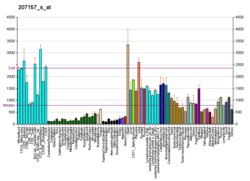GNG5
Guanine nucleotide-binding protein G(I)/G(S)/G(O) subunit gamma-5 is a protein that in humans is encoded by the GNG5 gene.[4][5]
References
- GRCh38: Ensembl release 89: ENSG00000174021 - Ensembl, May 2017
- "Human PubMed Reference:". National Center for Biotechnology Information, U.S. National Library of Medicine.
- "Mouse PubMed Reference:". National Center for Biotechnology Information, U.S. National Library of Medicine.
- Ahmad W, Li S, Chen H, Tuck-Muller CM, Pittler SJ, Aronson NN Jr (Aug 1995). "Lysosomal chitobiase (CTB) and the G-protein gamma 5 subunit (GNG5) genes co-localize to human chromosome 1p22". Cytogenet Cell Genet. 71 (1): 44–6. doi:10.1159/000134059. PMID 7606925.
- "Entrez Gene: GNG5 guanine nucleotide binding protein (G protein), gamma 5".
Further reading
- Fisher KJ, Aronson NN (1992). "Characterization of the cDNA and genomic sequence of a G protein gamma subunit (gamma 5)". Mol. Cell. Biol. 12 (4): 1585–91. PMC 369601. PMID 1549114.
- Yan K, Kalyanaraman V, Gautam N (1996). "Differential ability to form the G protein betagamma complex among members of the beta and gamma subunit families". J. Biol. Chem. 271 (12): 7141–6. doi:10.1074/jbc.271.12.7141. PMID 8636150.
- Mao M, Fu G, Wu JS, et al. (1998). "Identification of genes expressed in human CD34+ hematopoietic stem/progenitor cells by expressed sequence tags and efficient full-length cDNA cloning". Proc. Natl. Acad. Sci. U.S.A. 95 (14): 8175–80. doi:10.1073/pnas.95.14.8175. PMC 20949. PMID 9653160.
- Liu B, Aronson NN (1998). "Structure of human G protein G gamma 5 gene GNG5". Biochem. Biophys. Res. Commun. 251 (1): 88–94. doi:10.1006/bbrc.1998.9439. PMID 9790912.
- Zhang QH, Ye M, Wu XY, et al. (2001). "Cloning and Functional Analysis of cDNAs with Open Reading Frames for 300 Previously Undefined Genes Expressed in CD34+ Hematopoietic Stem/Progenitor Cells". Genome Res. 10 (10): 1546–60. doi:10.1101/gr.140200. PMC 310934. PMID 11042152.
- Strausberg RL, Feingold EA, Grouse LH, et al. (2003). "Generation and initial analysis of more than 15,000 full-length human and mouse cDNA sequences". Proc. Natl. Acad. Sci. U.S.A. 99 (26): 16899–903. doi:10.1073/pnas.242603899. PMC 139241. PMID 12477932.
- Cuello F, Schulze RA, Heemeyer F, et al. (2003). "Activation of heterotrimeric G proteins by a high energy phosphate transfer via nucleoside diphosphate kinase (NDPK) B and Gbeta subunits. Complex formation of NDPK B with Gbeta gamma dimers and phosphorylation of His-266 IN Gbeta". J. Biol. Chem. 278 (9): 7220–6. doi:10.1074/jbc.M210304200. PMID 12486123.
- Gevaert K, Goethals M, Martens L, et al. (2004). "Exploring proteomes and analyzing protein processing by mass spectrometric identification of sorted N-terminal peptides". Nat. Biotechnol. 21 (5): 566–9. doi:10.1038/nbt810. PMID 12665801.
- Gerhard DS, Wagner L, Feingold EA, et al. (2004). "The Status, Quality, and Expansion of the NIH Full-Length cDNA Project: The Mammalian Gene Collection (MGC)". Genome Res. 14 (10B): 2121–7. doi:10.1101/gr.2596504. PMC 528928. PMID 15489334.
- Gregory SG, Barlow KF, McLay KE, et al. (2006). "The DNA sequence and biological annotation of human chromosome 1". Nature. 441 (7091): 315–21. doi:10.1038/nature04727. PMID 16710414.
This article is issued from Wikipedia. The text is licensed under Creative Commons - Attribution - Sharealike. Additional terms may apply for the media files.


